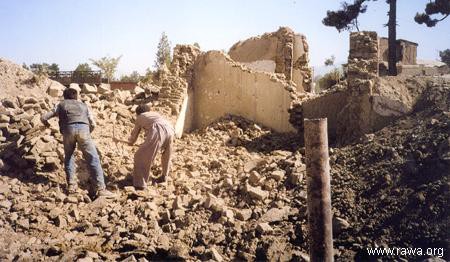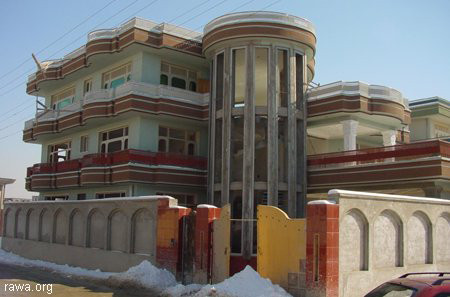By Jeffrey Fleishman
Reporting from Kabul, Afghanistan - The men come at dawn, a ragged, anxious collection of faces peeking through scarves and hoping for work as they stand in a traffic circle beneath billboards advertising war heroes and washing machines.


What has emerged across the provinces and throughout Kabul is a cruel economic pecking order of an unfinished war. Afghan businessmen dealing in imports are thriving, their new marble and tinted-glass houses rise like jewels on rough streets. Those working with foreign governments and international organizations are also prospering. But the rest, the majority, barely survive and wait for jobs that pay more than peddling oranges or washing cars.
They are bricklayers, gardeners, hole diggers and carpenters. Sometimes they are tapped on the shoulder, most times they are not, so they hunch amid the cars and fruit stands, knowing that the higher the sun climbs the lower their chances of returning home with money in their pockets.
"One day we work, three days we don't. How can life be good?" said Ahmed Jalal, poking his red-bearded chin through a crowd of laborers. "The Americans are sending cash to Afghanistan to build factories, but our officials are taking it for themselves. If there were factories do you think we'd be standing in this dusty place?"
As war with the Taliban rattles in the provinces, here in the capital,unemployment, poverty and corruption are regarded as more potent enemies. The national government extols the recent success of U.S. and Afghan troops pushing back militants in Marja, but jobless computer technicians and laborers who can't buy bread have folded away all the pretty promises they have heard.
"If the U.S. and other countries want a stable Afghanistan, they don't need war, they need to build industries," said Ahmad Morid Rahimi, a coordinator with a relief and job placement agency. "People join the Taliban. Why? To feed their families. Instead of sending 15,000 soldiers to fight in Marja, why didn't the U.S. spend those millions of dollars creating jobs?"
The country's economy has grown since the days of the Taliban. International aid has created thousands of jobs in fields such as communications, but deeper problems persist in a nation lacking in infrastructure and plagued by mismanagement.
Since 2001, Congress has authorized more than $39 billion in humanitarian and reconstruction aid for Afghanistan. But hundreds of millions of dollars that would lead to new factories and dams have been eroded by power shortages, wasteful contractors, security dangers and corruption.
What has emerged across the provinces and throughout Kabul is a cruel economic pecking order of an unfinished war. Afghan businessmen dealing in imports are thriving, their new marble and tinted-glass houses rise like jewels on rough streets. Those working with foreign governments and international organizations are also prospering. But the rest, the majority, barely survive and wait for jobs that pay more than peddling oranges or washing cars.
Outside Rahimi's office, men in blazers, resumes rolled in hand, squinted in the sunlight and scanned job postings on a bulletin board. There were openings in forestry, the beverage industry and emergency services. But the men were discouraged; in their experience, jobs vanish as quickly as they appear, many filled as a result of bribes or family connections.
"I don't know what to do," said Mohammad Yaqub, who studied agriculture in Russia, but has no money for a kickback. "I can't leave Afghanistan for work. Who would feed my family?"
Amil Zamuny, a driver in a black leather jacket and polished shoes, said he had applied for 20 jobs. His resume is written in English and begins with, "Respected Sir." Next to him, Hekmatullah Haidery ran his finger over the postings, bemused by all his days peering at salaries and titles he has yet to find in a nation with a 40% unemployment rate.
"I'm a graduate of a technical institute. I want to be a computer programmer or in administration," Haidery said. "I've been coming here for two months and have nothing."
Kabul is a place of desperate men searching to little avail. They wander through traffic past firewood sellers and boys hawking balloons; the war often seems distant, echoes in faraway mountains. But the unemployed are occasionally reminded that bloodshed can strike the capital with unnerving abandon. Suicide bombers and militants recently attacked two guesthouses, killing 16 people, mostly foreigners, near the circle where the laborers gather.
"Things are getting worse, not better," said one man whose white cap matched his beard. "There's fighting across the land. Solving the problems of this country is not in the hands of Afghans but in hands of other nations who meddle and cause trouble here."
The laborers know that bombs frighten off investors. Buildings don't get built and those who are poor, nearly half the population, stay that way. The other day at late morning most of the men lucky enough to be picked to haul cement or paint walls for $3 a shift were gone. Hundreds were left behind, to loosen their scarves, and pick at the patches on their coats.
"If the government could just improve security, maybe that would help," Mohammed Hossain, a father of five, said as fellow laborers pressed around him, wrongly thinking a hiring man had come. "I cannot remember when I had my last job. I think it was two months ago."
Faces, cheek-to-cheek, bore in like a weathered collage of a lost army. The men traded stories.
A slight laborer pushed to the front. As is customary for many Afghans, he gave only a single name, Omara. It's been 13 days since he last worked. The men shake their heads; for some it's been longer, for others shorter.
"I've been here since 6 a.m.," said Hatallah, who supports his mother and three sisters. "I'll do any kind of construction. I carried bricks four days ago. I'm engaged but I can't afford to marry. On the days I don't find work it's difficult to return home without food for the family."
The talk went on amid faint scents of diesel, dust and glue. Traffic clogged the circle, police whistles blew, buses skidded. Girls ran through market stalls, and farther on, mechanics fixed engines, black and glistening in the sun near men carrying blocks of cash and selling phone cards.
The laborers in the circle waited. A carpenter rode up on his bike. He opened a wooden box, showing off, to anyone who might need him, saws, files, rulers and a hammer.



